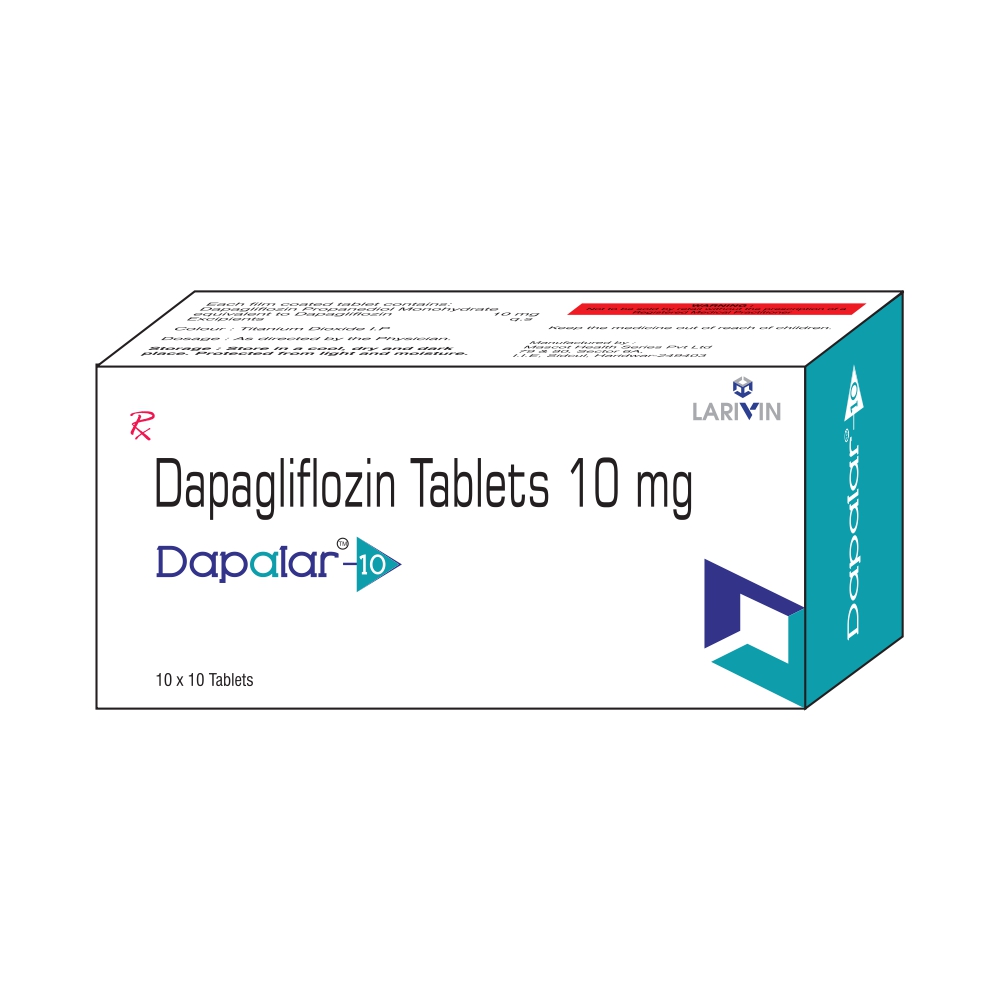- 044-24812581
- Plot No 15, 27th Street, Natesan Nagar, Maduravoyal, Chennai 600095
- +91 7845883586
- info@larivinpharma.com
DAPALAR 10

Dapagliflozin 10 mg Tablets
Pack: 10 tablets/strip
Dosage:
- Recommended Dose: One tablet daily, preferably taken in the morning, with or without food.
- Special Populations:
- Renal Impairment: Adjust dose based on renal function. Consult a healthcare professional for advice.
- Hepatic Impairment: Dose adjustment may be necessary. Follow medical guidance.
- Elderly: Caution is advised; monitor renal function and adjust dose as required.
Mode of Action:
Dapagliflozin is a reversible inhibitor of the sodium-glucose co-transporter 2 (SGLT2) protein. By inhibiting SGLT2, dapagliflozin reduces glucose reabsorption in the kidneys and increases urinary glucose excretion, leading to improved glycemic control in patients with type 2 diabetes. Additionally, dapagliflozin has been shown to reduce the risk of cardiovascular death or hospitalization for heart failure and may slow the progression of renal disease in patients with established atherosclerotic cardiovascular disease (CVD) or multiple CVD risk factors.
Indication:
- Uncontrolled Type 2 diabetes mellitus
- Diabetic patients with cardiovascular diseases
How to Take Dapalar 10:
- Take one tablet by mouth daily, preferably at the same time each day.
- Swallow the tablet whole with a glass of water.
- Dapalar 10 can be taken with or without food.
- Do not crush or chew the tablet.
Possible Side Effects:
Like all medications, Dapalar 10 can cause side effects, although not everyone will experience them. Some common side effects include:
- Urinary Tract Infections (UTIs): Symptoms may include pain or burning sensation during urination, cloudy or strong-smelling urine.
- Hypoglycemia (Low Blood Sugar): Particularly when used in combination with other antidiabetic medications. Symptoms may include dizziness, sweating, shaking, or confusion.
- Increased Urination: Dapagliflozin may cause increased frequency of urination, especially in the initial weeks of treatment.
- Thirst: You may feel an increased need to drink water.
- Genital Infections: Infections like yeast infections in women or balanitis in men.
- Ketoacidosis: A rare but serious condition characterized by high levels of ketones in the blood, which can cause symptoms like nausea, vomiting, abdominal pain, and confusion.
Precautions:
- Kidney Function: Regular monitoring of kidney function is recommended as dapagliflozin can affect renal performance.
- Hypovolemia: Monitor for signs and symptoms of volume depletion, especially in elderly patients.
- Bladder Cancer: Some studies suggest a possible increased risk of bladder cancer. Patients should discuss their risk factors with their healthcare provider.
Consult Your Doctor:
- If you experience any side effects or unusual symptoms.
- Before starting any new medications or supplements.
- If you have a history of bladder cancer or frequent urinary tract infections.
Disclaimer:
This information is provided for educational purposes only. For personalized medical advice and treatment options, consult a healthcare professional.
